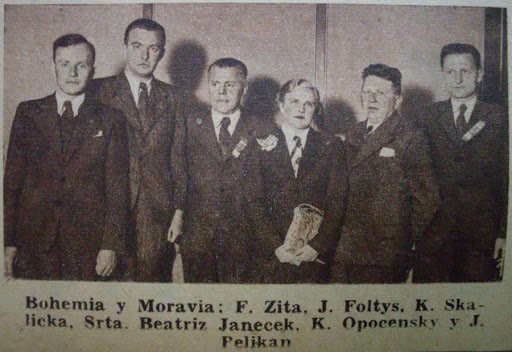The Chess Café U Nováků
The chess café U Nováků in Prague used to be a very popular gathering place for chess players from all over the world. What is not as widely known is the fact that the Chess Olympiad of 1931, sponsored by Tomáš Masaryk, the first president of Czechoslowakia, was held there as well. Even Alexander Alekhine, reigning world champion at the time, was present. He played for France on board one.

Alexander Alekhine playing Stahlberg at the Chess Olympiad 1931
The bohemian society of Prague used to meet at the café U Nováků to play chess, cards and billiards.
The floor below housed a well-known cabaret, which some of the guests liked to visit after they were done playing their games.

U Nováků on an old postcard
After the Velvet Revolution of 1990, the cabaret became privately owned. The beautiful historical chess tables of the U Nováků were sadly replaced by slot machines and roulette tables. For the chess players, this meant GAME OVER. They had to pack their bags and make way for the realities of capitalism. A pity!
As a student, I'd rather spend my time playing blitz games in this café than actually studying. It was not uncommon for these games to last until late into the night. I also regularly met the first Czechoslowakian professional Karel Opočenský there, who had played the final and most crucial game of the Chess Olympiad. His opponent in this game was Hans Kmoch (Austria) and it decided which medal would be assigned to whom. Later, Opo never liked to show this game - after all, he lost despite being two pawns up!
"A good dove will always find its way back home." The strong Czech player Karel Skalička, who had decided to never return to his home country after the Olympiad of 1939 in Buenos Aires, visited Prague shortly before his death.

At the Chess Olympiad 1939, the Czechoslowakian team was first listed as Bohemia and Moravia
At the U Nováků, I got to witness the cordial embrace of the former team mates Opočenský and Skalička.
Salo Flohr also used to frequently spend his time in the café, long before becoming a professional player.

Salo Flohr
in 1925, he and is brother Moses had come to Czechoslowakia from the Carpathians to find work and fill their empty stomachs. Both of them barely understood the Czech language. For a time, they sold freshly pickled sauerkraut on a market to survive. Carrying the heavy barrels was too exhausting for the rather delicate Salo, which is why he switched over to the "paper business", walking from one pub to the next as a newspaper boy. In doing so, he quite literally stumbled upon his vocation at the U Nováků, where he did not only learn the game of kings, but the Czech language as well!
Later on, during the socialist period, the café U Nováků greatly helped the security forces in performing their duties. Here, they could get an excellent overview of illegal activity, as gamblers, thieves, con men and all manner of petty criminals were laid out for them on a silver platter.

The U Nováků today
Before closing down once and for all, the café used to be open from 3.00 in the afternoon until 1.00 at night. Aside from the excellent beers, the café also served delicious and affordable meals until right before midnight. Its past guests include numerous foreign grandmasters, such as Najdorf, Hübner and Lombardy.
As mentioned above, in the time following the Velvet revolution it became impossible to afford the sky-high rent, and the chess players were scattered to the winds. Truly a pity!
When I come to Prague, I always enjoy visiting the historical rooms of the beautiful art noveau building, and to me, the old images and long forgotten faces come back to life...
Vlastimil Hort
Those who love Vlastimil Hort's memories can find countless other anecdotes in his book "Schachgeschichten" ("Chess Stories"). An English edition is to be released soon. Vlastimil Hort is currently working on a second volume.

Vlastimil Hort "Meine Schachgeschichten". 2019, page 82 ff. (Schach-Niggemann)
Translation from German by Hugo B. Janz
Links





























